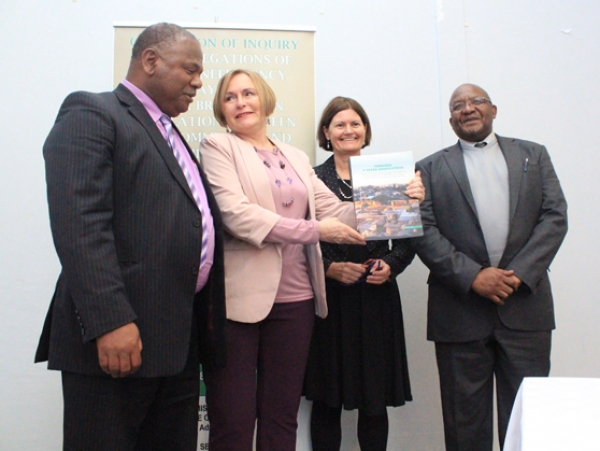

From left to right, Dan Plato and Helen Zille receive the report into policing in Khayelitsha from commissioners Kate O’Regan and Vusi Pikoli. Photo by Masixole Feni.
3 September 2014
The conclusion of the Khayelitsha Commission has left many people asking “what now?” writes Ayanda Nyoka.
It was a relief when the Khayelitsha Commission of Inquiry into policing released its final report on Monday, 25 August 2014, after a number of significant delays. It seems that such processes inevitably take longer than expected.
While politicians may attempt to use these commissions for scoring political points, one hopes that in the end justice will prevail. Given the broad and comprehensive consultations that were undertaken, this report is likely to be taken seriously by all stakeholders, unlike investigations such as the controversial Seriti Commission on the arms deal.
The Khayelitsha report details a number of key findings, ranging from historical legacies of violent crime, poverty,the harmful effects of illegal shebeens and an overburdened police force, to a complete breakdown of trust between the police and the community. Of course, the issues emerging from this Commission represent a microcosm of a broader South African problem - the problem of a weakening state. The effects of this have been disastrous and are widely demonstrated through processes by which communities create alternative systems of vigilantism.
Findings from the 2013 edition of the Institute for Justice and Reconciliation’s annual South African Reconciliation Barometer report confirm the extent to which the majority of South Africans feel politically disempowered. According to the Reconciliation Barometer, just over half (51.6%) of South Africans feel there is no way to make officials listen to public concerns. Only 48.3% trust leaders to do what is right.
Given the culture of impunity and scapegoating, in cases where those implicated are in the higher echelons of power, it is unsurprising that the majority of South Africans feel despondent. Though South Africa’s democratic institutions have been designed on par with international standards, there has not been sufficient political accountability to bolster public confidence in some of these institutions.
The government has contributed to this growing credibility gap by refusing to accede to the recommendations of constitutionally mandated institutions. The current stand-off between the Public Protector and the ANC about her findings on spending on Nkandla, President Jacob Zuma’s private residence, offers a case in point. Already, widespread scepticism exists about the role that compromised loyalties will play in the way that the ad-hoc parliamentary committee pronounces on Nkandla.
The conclusion of the Khayelitsha Commission has left many people asking “what now?” Will remedial action in line with the Commission’s actions be taken, or will we see another attempt to “make it go away”? If there is one thing a commission of this nature is able to do, it is to give voice to ordinary citizens, thereby contributing to a broader process of creating a vibrant democracy. But will its findings translate into meaningful and lasting change for the residents of Khayelitsha who experience both structural and physical violence on a daily basis?
Of course, commissions can only make recommendations and cannot enforce their findings. Their key mandate is to uncover the truth through an independent and credible process.
The recommendations of the Khayelitsha Commission have the potential for recreating relationships of trust between the police and the broader community. At the same time, the expectations generated from such a process, if not met, are likely to descend into further social fragmentation. Thus, the extent to which those vested with power fail to implement any of the recommendations will greatly undermine confidence in democratic institutions.
The Truth and Reconciliation Commission (TRC) offers us some very important lessons in this regard. Today many critics of the TRC misdirect their criticism of the outcomes of the process at the Commission. While the TRC was able to provide a long detailed report that contained recommendations on reparations, it was not vested with the powers to implement them. This was the duty of the State. Its findings provided the opportunity for major advances in overcoming the country’s apartheid legacy, but government’s failure to implement the recommendations, particularly those for victim reparations, was a major reversal of the gains made towards reconciliation and healing. Many of the victims that appeared before the TRC are still fighting for justice, more than a decade after the Commission’s report.
One hopes the Khayelitsha Commission that has seemingly been rooted in a deeper commitment to honour the many lives lost through violence, and to restore and uphold the dignity of these communities, will not suffer the same fate.
It is crucial that these commissions are matched by stronger oversight mechanisms to ensure that their recommendations are implemented and that there is stronger political accountability for everybody’s sake.
Ayanda Nyoka is the project leader for Inclusive Economies at the Institute for Justice and Reconciliation